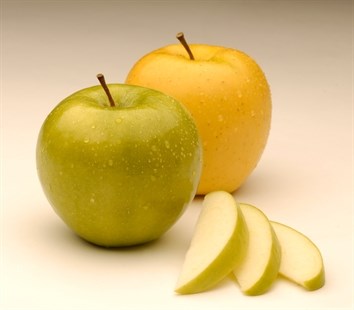
Okanagan Specialty Fruits is continuing to seek U.S. government approval to bring its non-browning Arctic apples down south. Pictured are Arctic Granny and Arctic Golden apples.
Image Credit: Okanagan Specialty Fruits/Arctic Apple
November 20, 2013 - 12:50 PM
PENTICTON - An orchardist is hoping a genetically modified, non-browning apple might boost the industry but that's not how others in the business see it.
Neal Carter and Okanagan Specialty Fruits in Summerland have been working on a solution to reverse shrinking apple sales. He said the public would be more likely to buy a fruit that doesn't brown but his methods are being opposed by other Okanagan and Similkameen producers.
The B.C. Fruit Growers' Association is unhappy with the idea of a genetically modified apple. President Jeet Dukhia of Vernon said the public would reject such fruit and the Arctic apple would only hurt the Okanagan apple's reputation and sales.
Carter is trying to get U.S. government approval to bring the Arctic down south. The association wants the Canadian federal government to put a moratorium on its development.
"It's not natural," Dukhia said. "They are modifying the gene and we are concerned about the marketplace (reaction)."
"We cross-breed apples naturally," Dukhia explained and the Ambrosia apple was born as a result.
Pesticides are still used in apple orchards to control insects and other problems but Dukhia said one cannot compare pesticides with genetic modifications.
"The pesticides we use are one of the safest pesticides in the world," he said. "Pesticides are much different than playing around with the genes."
The president said a survey supported the associations' views but Carter criticized that survey and said it was worded to get responses supporting the association's stance.
Carter has been running his company since 1996 and still considers himself a regular orchardist who drives a tractor alongside other employees. He said he gets frustrated sometimes when people dismiss the Arctic apple but he's not letting that stop him.
"You have groups talking about this being the death knell of the Okanagan apple..which is absolutely false."
He would appreciate if people would check his product before passing judgment.
"They never even held an Arctic apple," he said and many do not realize how simple the process is. He explained his company found a way to stop an apple's enzyme from turning the fruit brown and the technique can be applied to any variety.
Dukhia was worried about cross-pollination where genetic material from Arctic apples would be passed on to non-Arctic apples. Carter said this is not as big a problem as some make it out to be.
Apple pollen and trees do not rely on the wind to propagate but are pollinated by bees who stick close to their hives, and they don't venture far.
If a row of Arctic apple trees were lined up against a row of non-Arctic apple trees there might be some genetic material passed on Carter explained but it would not mean the entire orchard's affected. And new apple trees don't come from seeds, they come from saplings or branches.
Carter wants the apple to be the go-to fruit and have sales numbers go up instead of down. He pointed out the fruit is becoming more unpopular when stacked against others.
"People don't eat apples. It's too big a commitment," he said, compared to other choices. Browning keeps apples out of salads, fruit trays, dinners and more importantly out of people's hands and mouths. If the apple stayed white Carter expects people would buy more and eat more which would benefit the entire industry.
He currently plans to continue the U.S. approval process. Once he has the OK to bring his apples down south he'll go after Canadian government approval.
If Carter gets the nod to sell in Canada he plans to apply an Arctic sticker to each apple.
"This way, consumers will be able to find and learn more about our specific product, something a general genetically engineered label does not offer."
The views on genetic modifications will be examined at an upcoming Osoyoos presentation with a former Summerland Research Station scientist and a colleague present.
For readers looking for more about Okanagan fruit growers check out the association's website.
For more details on the Arctic apple check out the website and its parent site at Okanagan Specialty Fruits.
To contact a reporter for this story, to send photos or videos, email Shannon Quesnel at squesnel@infotelnews.ca, call 250-488-3065, send tweets to @shannonquesnel1 or @InfoNewsPentict.
News from © iNFOnews, 2013